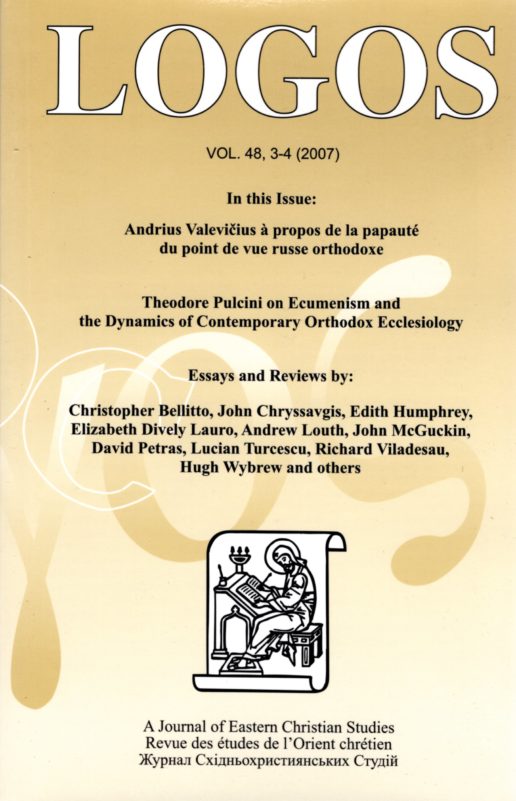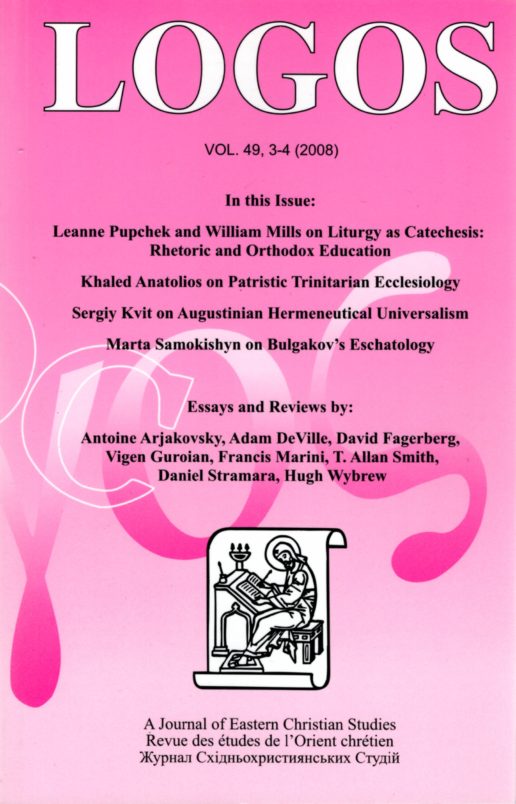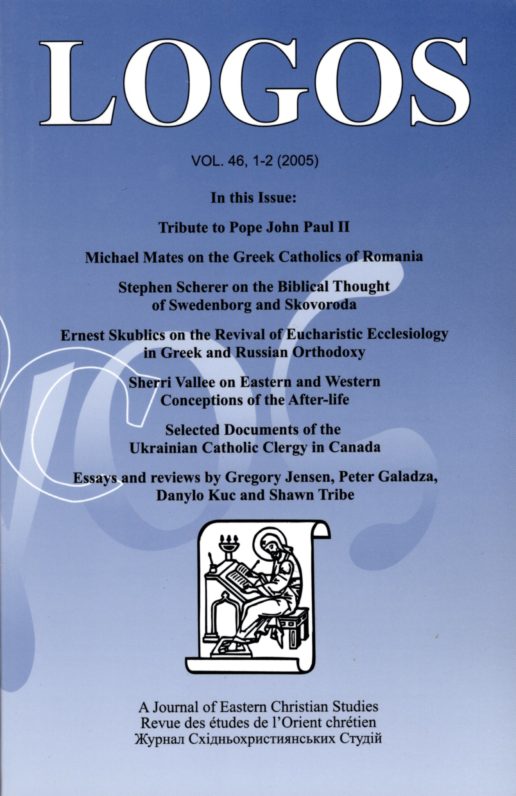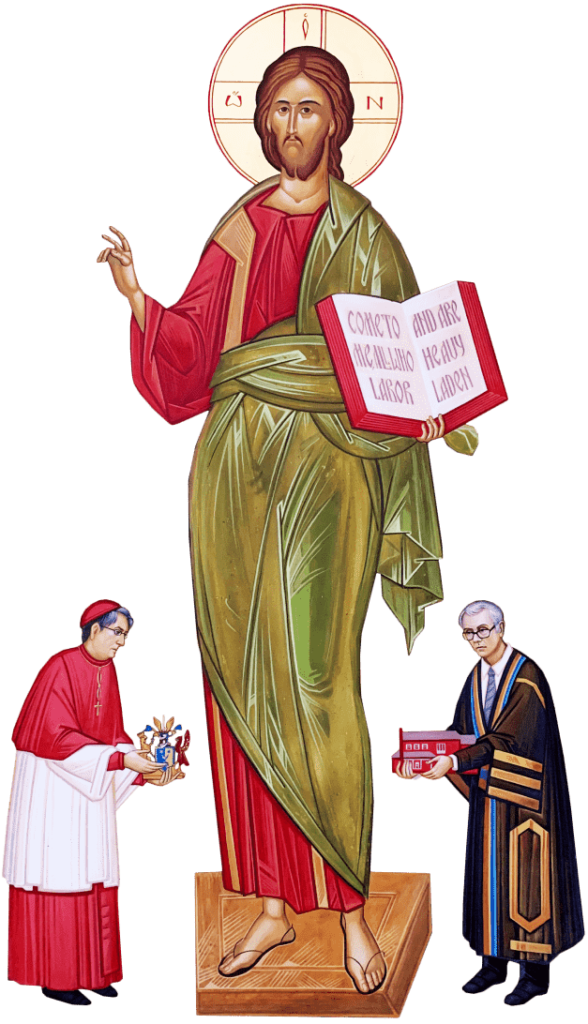Description
Table of Contents (PDF)
Editorial
The Silver Anniversary of a Golden Opportunity: A Personal Account of the Early Years and Reflections on the Accomplishments of the Sheptytsky Institute
Andriy Chirovsky (205) (PDF Open Access)
Articles
Pavel Florensky: His Life and Work (PDF sample)
Richard W. Armstrong (223)
Abstract
In this short biography, the author sketches the life of the Russian polymath, priest, mystic and martyr Pavel Florensky. Two lenses are adopted in presenting this exceptional personality: (1) the biographical photograph and (2) the biographical portrait. The first perspective provides the basic empirical data and material-efficient causes of Florensky’s life. The periods and themes covered in this section are Florensky’s Early Life, Professional Life, Life Extinguished and Life Remembered. The second perspective uncovers the true being and formal-final causes of Florensky’s life. The themes developed in this section are Florensky the Ontologico-Symbolical Seeker and Florensky the Icono-Mystical Witness. Afterward, a third and final section is appended, outlining a brief summary of the most serious appraisals of the person of Florensky. The study concludes that Florensky stands out as one of twentieth-century Christianity’s most outstanding luminaries, and arguably as one of the most intellectually, morally, spiritually and mystically endowed figures in all of Christian history.
Резюме
У цій короткій біографії автор представляє ескіз життя російського ерудита, священика, містика та мученика Павла Флоренського. Для представлення цієї неординарної особистості використано дві перспективи: 1) біографічна фотографія та 2) біографічний портрет. Перша перспектива відображає основні емпіричні дані й матеріяльно-дієву причину життя Флоренського. Періоди та теми цієї частини – це „Раннє життя, професійне життя, вигашене життя і життя в пам’яті інших” Флоренського. Друга перспектива розкриває правдиве буття і формально-телеологічні причини життя Флоренського. Теми розкриті у цій частині – це Флоренський як онтологічно-символічний шукач і Флоренський як іконо-містичний свідок. Опісля додано третю та останню частину, яка представляє короткий опис найбільш серйозних оцінок особи Флоренського. У дослідженні дойдено до висновку, що Флоренський є одним із найвидатніших християнських світочів двадцятого століття і, можливо, одним з найбільш інтелектуальних, моральних, духовних та містично обдарованих осіб цілої християнської історії.
Parenting in the Spirit: Helping Children Stay on the King’s Highway (PDF sample)
Theresa Zolner (253)
Abstract
In this ground breaking article, the author, an Eastern Christian and practicing child and family psychologist, both calls for much more work to analyze and integrate secular psychology and Eastern Christian spirituality and psychology, and deepens that very process by briefly analyzing developmental theories of such as Sigmund and Anna Freud, Jean Piaget, Lawrence Kohlberg, Erik Erikson, John Watson, Walter Bandura, William Kessen, Harry Stack Sullivan, and John Bowlby. These are set alongside prominent psychological theories in Greek patristic and monastic literature from the Philokalia as well as such ancient figures as Sts. Basil the Great, Isaiah the Solitary, Philotheos of Sinai, Hesychios the Priest, Symeon Metaphrastis, Diadochos of Photiki, Anthony the Great; and, in the modern period, Archbishop Chrysostomos of Etna, John Boojamra, Anthony Coniaris, and others. The author focuses in particular on patristic-monastic notions of psyche, nous, dianoia, logos, and theosis, which are analyzed to find where there are possible semantic overlaps with analogous terms in the psychological literature of today. Eastern Christian parents, in seeking to fulfill their role as pneumatophors, must practice theosis and strive to help their children grow into that practice by means of de-deification of the ego, rejection of the logismoi, and acquisition of self-control and a spirit of repentance.
Резюме
У своїй новаторській статті східно-християнський автор, практикуючий дитячий та сімейний психолог, заохочує до посиленої праці над аналізом та інтеграцією світської психології зі cхідно-християнською духовністю та психологією. Цей процес вона поглиблює коротким аналізом теорій розвитку психологів Зиґмунда та Анни Фройд, Жана Піяже, Лоуренса Колберґа, Еріка Еріксона, Джона Ватсона, Вальтера Бандури, Вільяма Кессена, Гаррі Стак Суллівана та Джона Бовлбі. Цей набір психологічних теорій порівнюється з грецькою патристичною та монашою літературою з „Добротолюбія”, а також з такими давніми постаттями як Василій Великий, Ісая Самітник, Філофей Синайський, Ісихій єрей, Симеон Метафраст, Діадох Фотікійський, Антоній Великий, та авторами сучасного періоду: Архієпископ Хризостом з Етни, Джон Бужамра, Антоній Коніаріс, та інші. Автор зокрема зосереджується на святоотцівських-монаших поняттях психе, нус, діаноя, логос i теозіс та проводить їх аналіз, щоби виявити потеційну семантичну схожість з аналогічними сучасними психологічними термінами. Східно-християнські батьки, прагнучи сповнити свою роль духоносців, зобов’язані практикувати обоження та старатися допомогти своїм дітям зростати в цій практиці за допомогою деобожнювання власного „я”, відмовою від лукавих помислів, присвоєння самоконтролю та духа покаяння.
Symbols and Symbolism in the Liturgy Revisited: A Ricoeurian Critique of Schmemann’s Symbology (PDF sample)
Brian Butcher (293)
Abstract
This paper probes the discrepancy Alexander Schmemann posited between the true meaning of the symbolism of the liturgy, as disclosed in and by the rites themselves, and that which obtains in the classic genre of liturgical commentary. Informed by Paul Ricoeur’s philosophy of symbol and metaphor, the author argues that Schmemann’s wider oeuvre can be marshalled in favour of an interpretative pluralism, over and against the univocity to which the latter appeals in his provocative article, “Symbols and Symbolism in the Liturgy: Liturgical Symbols and Their Theological Interpretation.” Roundly critiquing therein the patristic commentators and their illustrative and mystagogical tendencies, Schmemann boldly charges them with “apply[ing] to the liturgy their particular vision rather than seek[ing] in the liturgy the vision implied in its own ordo, in its own structures and texts, in short, in its own symbolism” – arguably a capital instance of what Paul Ricoeur has called the “conflict of interpretations.” In response to this, the author finds a potential mediation in the triadic categories of For the Life of the World. The ensuing hermeneutical model is applied to a select instance of symbolic polemic within the Byzantine liturgical context, in order to vindicate the Ricoeurian “surplus of meaning” implicit in Schmemann’s original intuition, as explicated in his Introduction to Liturgical Theology, of a “Byzantine synthesis.”
Резюме
Ця стаття досліджує різницю, яку Олександр Шмеман поклав між справжнім значенням символізму літургії (богослуження), виявлену у та через самі обряди, та таким, що проявляється у клясичному жанрі літургійного коментаря. Використовуючи філософію символу та метафори Поля Рікера, автор статті стверджує, що широкий доробок Шмемана може бути задіяним на користь тлумачного плюралізму проти однозначности, на яку він полягав у своїй провокативній статті „Символи та символізм в Літургії: Літургійні символи та їхня богословська інтерпретація.” Різко критикуючи патристичних коментаторів з їхніми ілюстративними та містагогійними нахилами, Шмеман у цій статті виразно звинувачує „у застосовуванні в літургії їхнього власного бачення замість пошуку світогляду притаманного їй ordo, у власній структурі й текстах, коротше кажучи, в її власному символізмі” – правдоподібно, основний приклад того, що Пол Рікер називав „конфліктом інтерпретацій.” Відповіддю на це автор бачить потенційне посередництво у троїчних категоріях За життя світу. Саме цей герменевтичний метод застосовується в статті для певного прикладу символічної полеміки всередині Візантійського літургічного контексту, щоби виправдати Рікерський “надлишок сенсу”, прихований в оригінальній інтуїції Шмемана якa говорить в його „Вступі до Літургійного богослов’я” про „Візантійський синтез.”
Notes, Essays, Lectures
The Canonical Rules of the Orthodox Church: Theory and Practice (PDF sample)
Vassa Larin (313)
Book Reviews
Brandon, Ray and Wendy Lower, eds. The Shoah in Ukraine: History, Testimony, Memorialization (Bloomington and Indianapolis: Indiana University Press, 2010), 392 pp.
Myroslav Shkandrij (331)
Jarrett Zigon, “HIV Is God’s Blessing”: Rehabilitating Morality in Neoliberal Russia (University of California Press, 2010), 280 pp.
Sarah D. Phillips (336)
Anthony O’Mahony, ed., Christianity and Jerusalem. Studies in Modern Theology and Politics in the Holy Land (Leominster: Gracewing, 2010), ix + 326 pp.
Stephen W. Need (339)
Philip Wood, “We Have No King but Christ”: Christian Political Thought in Greater Syria on the Eve of the Arab Conquest (c. 400–585) (Oxford: Oxford University Press, 2010), 295 pp.
David Bertaina (343)
Diarmaid MacCulloch, Christianity, The First Three Thousand Years (NY: Viking, 2009), xviii + 1161 pages.
Michael Plekon (347)
Maxwell Johnson, ed., Issues in Eucharistic Praying in East and West: Essays in Liturgical and Theological Analysis (Collegeville, MN: Liturgical Press, 2010), 416 pp.
Nicholas Denysenko (350)
Peter J. Leithart, Defending Constantine: The Twilight of an Empire and the Dawn of Christendom (InterVarsity Press, 2010), 373 pp.
Daniel Larison (354)
G.M. Hamburg and Randall A. Poole, eds., A History of Russian Philosophy 1830–1930: Faith, Reason, and the Defense of Human Dignity (Cambridge, UK: Cambridge University Press, 2010), xv + 423 pp.
Robert F. Slesinski (358)
S.L. Frank, The Meaning of Life, translated by Boris Jakim (Grand Rapids, Michigan/Cambridge, U.K.: William B. Eerdmans Publishing Company, 2010), xvi + 138 pp.
Robert F. Slesinski (363)
Laura Engelstein, Slavophile Empire: Imperial Russia’s Illiberal Path (Ithaca & London: Cornell University Press, 2009), xiv + 239 pp.
Robert F. Slesinski (365)
Vladimir Solovyov, The Principles of Integral Knowledge trans. Valeria Z. Nollan (Grand Rapids, MI: Eerdmans, 2008), 179 pp.
Robert F. Slesinski (368)
Basilio Petrà, L’Etica Ortodossa: Storia, fonti, identità (Assisi: Cittadella Editrice, 2010), 327 pp.
Robert F. Slesinski (369)
James Siemens, The Christology of Theodore of Tarsus: The Laterculus Malalianus and the Person and Work of Christ (Brepols, 2010), 211 pp.
John Hunwicke (372)
Ana Smith Iltis and Mark J. Cherry, Eds. At the Roots of Christian Bioethics: Critical Essays on the Thought of H. Tristram Engelhardt, Jr. (Salem, MA: Scrivener Press, 2010), 339 pp.
Stanley Samuel Harakas (376)
Rachel Scott, The Challenge of Political Islam: Non-Muslims and the Egyptian State (Stanford, CA: Stanford University Press, 2010), 277 pp.
Nelly van Doorn-Harder (379)
Bryn Geffert, Eastern Orthodox and Anglicans. Diplomacy, Theology, and the Politics of Interwar Ecumenism (University of Notre Dame Press, 2010), ix + 502 pp. + 22 plates.
Hugh Wybrew (383)
Victor Roudometov and Vasilios N. Makrides, eds., Orthodox Christianity in 21st Century Greece: the Role of Religion in Culture, Ethnicity, and Politics (Ashgate, 2010), 258 pp.
Nicolas Prevelakis (387)
Lee Trepanier, Political Symbols in Russian History: Church, State, and the Quest for Order and Justice (Lanham, MD: Lexington Books, 2010), 197 pp.
Heather Bailey (391)
Briefly Noted (395)
Contributors (403)
Language: English, French, Italian, Ukrainian
Softcover: vi, 222 pages
Publisher: The Metropolitan Sheptytsky Institute of Eastern Christian Studies
ISSN: 0024-5895
Digital File: $16
Size: 21 MB
A link to the PDF file of this title will be sent to you. The PDF file is for your personal use only. You may not copy, share, publish, or sell the file. Protected by copyright of the Metropolitan Andrey Sheptytsky Institute of Eastern Christian Studies.






